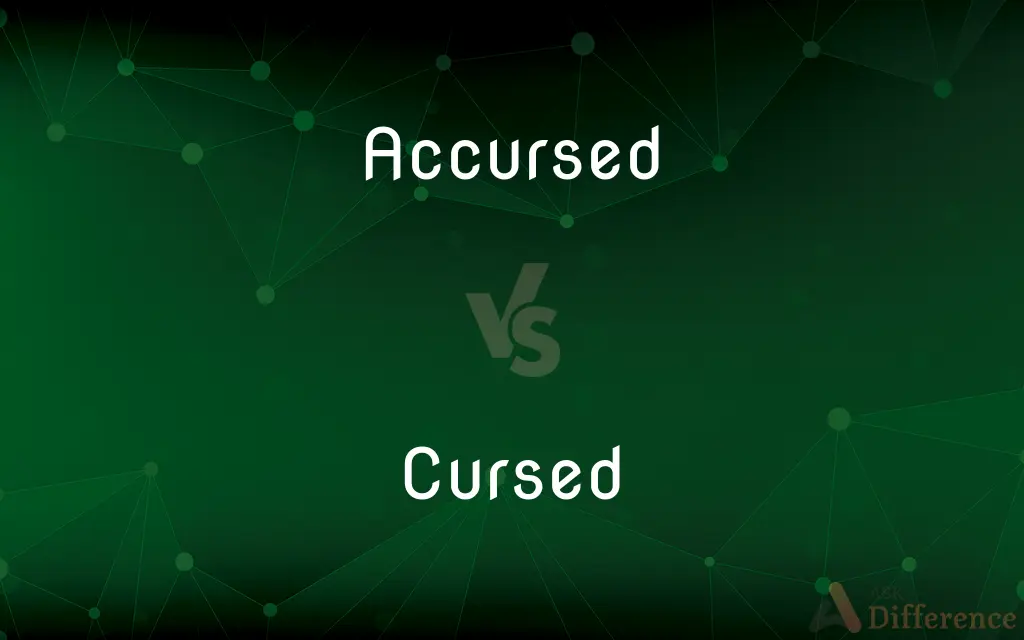Accursed vs. Cursed — What's the Difference?
Edited by Tayyaba Rehman — By Fiza Rafique — Updated on March 5, 2024
"Accursed" describes something or someone under a curse or detestable, emphasizing its loathsome nature. "Cursed" refers to the state of being under a curse, focusing on the affliction or misfortune.

Difference Between Accursed and Cursed
Table of Contents
ADVERTISEMENT
Key Differences
"Accursed" is an adjective that conveys a strong sense of being under a curse, combined with a sense of abhorrence or detestation. It is often used to describe something or someone that is not only cursed but also considered repugnant or deserving of scorn. On the other hand, "cursed" is more commonly used to describe the state of being under a curse without necessarily implying the same level of detestation as "accursed." "Cursed" can be applied to individuals, objects, or places that are believed to be under a supernatural spell causing misfortune or harm. For example, a "cursed" house is one thought to bring bad luck to its inhabitants because of a spell or curse placed upon it.
While both terms deal with the concept of curses, "accursed" carries a heavier connotation, often used in literature or narrative to add depth to the severity and repulsion associated with the curse. "Cursed," meanwhile, is a more neutral term that straightforwardly denotes the influence of a curse.
The use of "accursed" can also imply a moral or ethical judgment, suggesting that the cursed entity is not only suffering from a curse but is also morally reprehensible or evil. Conversely, being "cursed" does not necessarily carry implications regarding the moral character of the afflicted party or object; it focuses more on the misfortune that the curse brings.
"Accursed" tends to appear in more formal, literary, or archaic contexts, emphasizing a curse's impact on making something detestable. "Cursed," however, is widely used in both casual and formal language to indicate the presence of a curse, making it more common in everyday speech.
Comparison Chart
Connotation
Strongly negative, implying detestation
Neutral, indicating affliction or misfortune
ADVERTISEMENT
Focus
The loathsome nature of the cursed entity
The state of being under a curse
Usage Context
More formal, literary, or archaic
Common in both casual and formal language
Implication
Moral or ethical judgment of repulsion
Simply the presence of a supernatural affliction
Application
Often used to describe objects or entities with a sense of abhorrence
Applied to individuals, objects, or places affected by a curse
Compare with Definitions
Accursed
Loathed for its evil nature.
He lived in the accursed mansion, shunned by all.
Cursed
Under a spell causing misfortune.
They entered the cursed forest, ignoring the warnings.
Accursed
Under a curse and detestable.
The accursed artifact brought doom to all who touched it.
Cursed
Subject to a supernatural affliction.
The cursed village lay in ruins, abandoned and forgotten.
Accursed
Deserving of scorn because of a curse.
The accursed thief wandered the earth, unable to find rest.
Cursed
Influenced by or bearing a curse.
The cursed sword could not be unsheathed by any but its true owner.
Accursed
Associated with intense dislike or abhorrence.
She found the accursed book among her grandfather's belongings, its pages filled with dark magic.
Cursed
Afflicted by a curse.
The cursed necklace always brought misfortune to its owner.
Accursed
Morally reprehensible and cursed.
The village spoke of the accursed woods, where no one dared to enter.
Cursed
Marked by bad luck or unhappiness.
He led a cursed life, full of trials and tribulations.
Accursed
Abominable; hateful
This accursed mud.
Cursed
So wicked and detestable as to deserve to be cursed.
Accursed
Doomed to destruction or misery; cursed; hence, bad enough to be under the curse; execrable; detestable; exceedingly hateful; - as, an accursed deed.
Cursed
Under some divine harm, malady, or other curse.
Cursed
Deserving a curse; execrable; hateful; detestable; abominable.
Let us fly this cursed place.
This cursed quarrel be no more renewed.
Common Curiosities
How does the implication of a moral judgment differ between "accursed" and "cursed"?
"Accursed" often carries an implication of moral judgment, suggesting that the cursed entity is also evil or detestable, while "cursed" primarily denotes the presence of a curse without necessarily implying moral judgment.
Can "accursed" and "cursed" be used interchangeably?
While they can be used in similar contexts because of their related meanings, "accursed" carries a stronger connotation of detestation and moral reprehensibility, making it less interchangeable in scenarios that do not imply such severity.
Can "cursed" have positive connotations or be used humorously?
While traditionally associated with misfortune, "cursed" can be used humorously or ironically in modern slang, referring to something unusually quirky, troublesome, or amusingly odd without actual malice or harm intended.
Are there cultural differences in how curses are perceived?
Yes, perceptions of curses and the use of terms like "accursed" and "cursed" can vary significantly across cultures, influenced by folklore, religion, and superstition.
How does the perception of "cursed" and "accursed" items vary in different cultures?
Cultural backgrounds significantly influence the perception of curses. In some cultures, "cursed" and "accursed" items may be taken very seriously, associated with deep superstitions or religious beliefs, while in others, they might be viewed more as folklore or subjects of fascination without genuine fear or revulsion.
Is "accursed" only used in fictional or literary contexts?
"Accursed" is more common in literary, archaic, or formal language, but it's not exclusively used in fictional contexts. It can also appear in historical texts or in a rhetorical sense to convey strong dislike.
Can a person be described as "accursed"?
Yes, a person can be described as "accursed" when they are considered to be under a curse and particularly detestable or morally reprehensible.
What kind of narrative or literary effect does using "accursed" have compared to "cursed"?
Using "accursed" in a narrative or literary context adds a layer of intensity and repulsion, enhancing the perceived evil or malevolence of a character, object, or place, whereas "cursed" focuses more on the affliction or misfortune aspect, potentially evoking sympathy or intrigue.
Can an object, place, or event be described as "accursed"?
Yes, objects, places, and even events can be described as "accursed" when they are believed to bring misfortune or are particularly detestable due to a curse or their associated history.
Is there a historical context where "accursed" was more commonly used than it is today?
Historically, "accursed" was more commonly used in English, especially in religious or mythological texts, to denote things or people that were under divine or supernatural condemnation. Its usage has declined in modern language, becoming more associated with archaic or formal contexts.
Share Your Discovery

Previous Comparison
Aspire vs. Inspiration
Next Comparison
Rotisserie vs. GrillAuthor Spotlight
Written by
Fiza RafiqueFiza Rafique is a skilled content writer at AskDifference.com, where she meticulously refines and enhances written pieces. Drawing from her vast editorial expertise, Fiza ensures clarity, accuracy, and precision in every article. Passionate about language, she continually seeks to elevate the quality of content for readers worldwide.
Edited by
Tayyaba RehmanTayyaba Rehman is a distinguished writer, currently serving as a primary contributor to askdifference.com. As a researcher in semantics and etymology, Tayyaba's passion for the complexity of languages and their distinctions has found a perfect home on the platform. Tayyaba delves into the intricacies of language, distinguishing between commonly confused words and phrases, thereby providing clarity for readers worldwide.















































